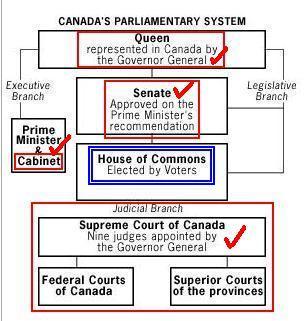Independent ...
The check marks indicate the appointments made by the government, which, in effect means the Prime Minister, starting at the top with the Governor General, though he may have / has had input from advisors. Nevertheless, the final decision is his. Cabinet Ministers serve at the PM's pleasure and may be turfed, at will, by the PM. Judicial appointees, on the other hand, remain in position much longer, hence have great long-term effect. Given the activist nature of the current left leaning Supreme Court of Canada (SCOC), for example, do you think this works for the good of Canada in the long run? Is the SCOC representative of the range of views of Canadians or is it really a governing party court, hence Liberal since they have been in power so long? Is there anything wrong with this? You, the voter, get to choose the Members of the House of Commons, but their influence may be little on the appointment process. Advisors surrounding the PM possibly have a larger influence, but did you elect them or did they come into the PMO as cronies and aides trusted by the Prime Minister? Party discipline renders most MP's puppets of the Prime Minister and his advisors, given the pressures on ordinary MP's to vote with the governing party. As for those in Opposition, party discipline plays a large part also. All MP's are subject to party discipline if they want their nomination papers to be signed for the next election. Parachuting of candidates puts the lie to local riding association power to nominate MP's in some cases.
Note the power of the Prime Minister in this chart. (from the CTV website -- I inserted the red and blue outlines.)

Appointment and Regulation of Judges Wikipedia, "Court System of Canada"
Judges in Canada are appointed and not elected. Judges of the Supreme Court of Canada, the appellate courts and the "superior" courts are appointed by the federal government. Thus, judges of the Ontario Superior Court of Justice are chosen not by Ontario's provincial government but by the same level of government that appoints judges to the federal courts. Meanwhile, judicial appointments to judicial posts in the "inferior" or "provincial" courts are made by the local provincial government. [. . . . ] Those who favour the appointment method point out that the election approach would threaten the judiciary's ability to be independent in its decision-making.
Therefore, Liberal appointees are independent ......


0 Comments:
Post a Comment
<< Home